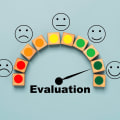In today's competitive business landscape, implementing a CRM system has become a necessity for companies looking to stay ahead of the game. However, simply investing in a CRM software is not enough. To truly reap the benefits of this powerful tool, it is crucial to measure its success and return on investment (ROI). This comprehensive guide will provide you with all the necessary information to effectively measure the success and ROI of your CRM implementation.
Whether you are just starting out with CRM or looking to maximize your current system, this article will cover everything you need to know. So, let's dive in and discover how you can make the most out of your CRM implementation and training efforts. First, let's start with understanding the importance of measuring success and ROI of CRM implementation. Many companies invest a significant amount of time and resources into implementing a CRM system, but without proper measurement, it's difficult to determine if the implementation was successful or if it's providing a return on investment. This is where understanding best practices for measuring success and ROI becomes crucial. One key aspect of measuring success is choosing the right tools and software for your specific business needs.
There are numerous options available in the market, so it's essential to do your research and select the one that aligns with your goals and objectives. For example, some CRMs may specialize in sales management, while others may focus on marketing or customer service. It's important to consider which areas of your business will benefit most from a CRM system. Next, successful implementation and training are crucial for maximizing the ROI of your CRM system. It's not enough to simply install the software and expect it to work miracles.
Proper training is necessary to ensure all employees understand how to use the CRM effectively and efficiently. This will not only improve the overall adoption of the system but also increase its chances of success. Another important aspect to consider is optimizing your current CRM system. Even if you already have a CRM in place, it's essential to regularly review and assess its performance. Are there any areas that can be improved? Are there any new features or updates available that can enhance its functionality? Regular optimization ensures your CRM system is always working at its best and providing a high ROI. Additionally, integrating your CRM with other business processes can greatly improve its effectiveness and ROI.
For example, integrating your CRM with your email marketing platform allows for more targeted and personalized communication with customers. Or, integrating it with your accounting software can provide valuable insights into customer spending and purchasing behavior. By connecting your CRM with other systems, you can gain a more comprehensive understanding of your customers and their needs. To sum it up, measuring success and ROI of CRM implementation is crucial for any business looking to improve their customer relationship management strategies and processes. By following these best practices, including choosing the right tools, successful implementation and training, regular optimization, and integration with other business processes, you can maximize the ROI of your CRM system and see significant improvements in customer satisfaction and retention.
Optimizing Your Current CRM System
In order to truly maximize the ROI of your CRM implementation, it's crucial to regularly assess and update your current CRM system.This means taking a close look at your processes, strategies, and tools to ensure they are still meeting the needs of your organization and customers. Regular assessment allows you to identify any gaps or inefficiencies in your CRM system that may be hindering its success. By addressing these issues and making updates as needed, you can improve the overall effectiveness of your CRM implementation and ultimately see a higher return on investment. Additionally, as technology and customer behaviors are constantly evolving, it's important to stay updated and make necessary changes to your CRM system. This will ensure that you are able to effectively meet the changing needs and expectations of your customers, leading to better engagement and ultimately, increased ROI.
Integrating Your CRM with Other Business Processes
One of the key ways to enhance the effectiveness of your CRM system is through integration with other business processes. By integrating your CRM with other tools and software, you can streamline your processes and improve the overall efficiency of your organization. For example, integrating your CRM with your email marketing platform allows for better tracking and analysis of customer interactions.This can help you target your marketing efforts more effectively and drive better results. Similarly, integrating your CRM with your sales management software can help you track leads and conversions, leading to improved sales performance. In addition, integrating your CRM with other systems such as accounting and inventory management can provide a more comprehensive view of your customers and their purchasing behaviors. This can help you tailor your approach and improve customer satisfaction. Overall, integration can not only enhance the effectiveness of your CRM system, but it can also provide a more holistic view of your business operations. By combining data from various sources, you can gain valuable insights and make more informed decisions for the success of your organization.
Successful Implementation and Training
When it comes to implementing a CRM system, it's important to have a well-thought-out plan in place.This includes choosing the right tools and software, as well as training your team on how to effectively use the new system. The first step in ensuring a successful CRM implementation is to clearly define your goals and objectives. What do you want to achieve with this new system? What are the key metrics you will use to measure success and ROI?Next, it's important to choose the right CRM software that aligns with your goals and objectives. This could include features such as lead management, customer segmentation, and automated workflows. Once you have selected the right CRM software, it's time to implement it into your business processes. This involves setting up the system, importing data, and customizing it to fit your specific needs. Training is also a crucial aspect of successful CRM implementation.
Your team needs to be familiar with the new system and know how to use it effectively. This could include providing hands-on training, online tutorials, and ongoing support. Lastly, it's important to continuously monitor and evaluate the success of your CRM implementation. Are you seeing improvements in customer satisfaction? Are sales and revenue increasing? By regularly tracking key metrics, you can make adjustments and improvements to ensure maximum ROI.
Choosing the Right Tools and Software
When it comes to selecting a CRM, it's important to choose one that aligns with your business goals. This means considering factors such as your company's size, industry, and specific needs.Here are some tips to help you select the right tools and software for your CRM implementation:
- Define Your Objectives: Before you start looking at different CRM options, it's crucial to determine what you want to achieve with your CRM implementation. Are you looking to improve customer satisfaction? Increase sales? Streamline processes? Knowing your objectives will help you narrow down your choices and choose a CRM that best fits your goals.
- Consider Scalability: As your business grows, so will your customer base. Make sure the CRM you choose has the ability to scale with your company's growth. This will save you from having to switch to a new system in the future.
- Look for Customization Options: Every business is unique and has its own specific needs.
A good CRM should allow for customization to fit your company's processes and workflows. This will ensure that the CRM is tailored to your business and can effectively meet your goals.
- Check for Integration Capabilities: Your CRM should be able to integrate with other tools and software that you use, such as email marketing platforms or project management software. This will help streamline your processes and make data sharing easier between systems.
- Consider User-Friendliness: Your employees will be using the CRM on a daily basis, so it's important to choose one that is user-friendly and easy to navigate. This will save time on training and ensure higher adoption rates among employees.
By following the best practices outlined in this article, you can ensure your CRM system is providing a high ROI and contributing to the overall success of your business. Remember, choosing the right tools, successful implementation and training, regular optimization, and integration with other business processes are key factors in maximizing the ROI of your CRM implementation.



